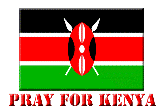FP: What is the root cause of the past few weeks of violence in Kenya? Is it economic, social, or tribal?
JG: The seeds of the current crisis were sown long ago, but the determined weeding took place between August 2004 and December 2007. Inequality is at the heart of it. In a place like Kenya, people can express their anger over economic inequality in regional or ethnic terms when the ruling elites aren't able to give people reasonable confidence that there is (or at least will be) equal access to economic opportunity and justice. Issues that give inequality meaning—the use of violence for political purposes, genuine land grievances, conspicuously corrupt leadership—have been bubbling under the surface for decades. These factors combined with rapid urbanization, high unemployment, especially among young males, ethnic political mobilization, the free flow of information, huge democratic expectations and, finally an incompetently rigged election, to ultimately boil over into a crisis. So, it's not just a 'tribal' thing.
FP: The international community has been a steady backer of President Mwai Kibaki. In June 2007, the United Nations even awarded the Kenyan government its "Global Prize for Progress in Governance." Do you think the international community—the U.N., the World Bank, Western governments—got Kibaki and Kenya wrong?
JG: Sections of the international community did not necessarily ‘get it wrong’ because they were well intentioned. But to an extent, they didn't ‘get it’ at all. It's not as though between June, when Kenya was awarded the governance prize, and December, when the election took place, things changed dramatically. Up to the last minute, the World Bank was effusive in its praise of Kenya’s development, despite its own statistics that showed something was wrong on the governance front, as did reports by other organizations. So, the analysis was not wrong. The underlying assumptions were.
They were also overly excited by the growth statistics. It’s true that the private sector is the key to the future of Africa, but one has to ask carefully what the private sector means politically in different contexts. In relatively small economies, it tends to be dominated by small groups of individuals linked together in a series of incestuous relationships that stretch across all sectors of business and into the political, security, and bureaucratic realms. In highly diverse societies with a history of structural domination by minorities, such as Kenya’s, 'growth' can lead to widespread ethnic or regional resentments when people start to compare their economic status with that of other groups. With enough repression, this can be sustainable. But Africa democratized in the 1990s as rapidly as it joined the global economy in the late 1980s.
FP: What do you think the West always gets wrong about Africa? What does it get right?
JG: Africans’ experience of the modern state is of an insecure, fierce, and secretive creature that extracts economically on behalf of an exclusive identifiable minority using disproportionate violence. This creature has too often served Western interests. The West is most effective in Africa when it engages around issues that cause the rest of the world to admire it: individual freedoms and liberties, the rule of law, rewarding private innovation etc. The lives of African women, for example, have been greatly transformed by Western encouragement. But when the West gets it wrong it tends to do so reverberatingly, such as backing dictators during the Cold War who laid parts of the continent to waste and oppressed their populations to the extent that the initial release from these contrived and externally backed conditions was accompanied by tremendous violence and dislocation. Similarly, the West remained steadfast in its support of apartheid in South Africa for too long. This explains in part the continuing ambivalence of the continent's leaders when confronted with the excesses of Robert Mugabe, who is an increasingly decrepit icon of the continent’s struggle against minority rule.
Quotes from Seven questions:What's the matter with Kenya?
Condoleeza Rice answered questions to reporters yesterday and outlined four items to which Kofi Annan, ODM, and PNU have agreed to. She acknowledged that a political settlement is urgent, but recognised that some of the reforms will take time to put in place.
This is ODM's proposal on how to stop the crisis.
Reforms could see the return of the powerful Prime Minister post.
Diplomats say Kibaki's strategy of playing for time in the hope of entrenching his position as opposition anger dissipates is dangerous. There are reports that some militia groups that caused much of the initial ethnic violence and subsequent reprisals in western Kenya and Nairobi are restocking their arsenals.The ODM needs to be able to show something tangible to their supporters soon," said one European diplomat. "If not, the violence could easily restart and neither they [the ODM] nor the government will be able to stop it."
Samuel Mohochi executive director of the Independent Medico-Legal Unit. With the help of the local cell phone company, his organization has set up a toll free service for people to report missing or dead relatives.
Can Ruto Scheme Secure A 3 Million Vote Lead Over His Opponents?
-
President William Ruto's puzzling declaration that he will win the upcoming
Presidential elections in 2027 by a margin of between 2 and 3 million votes
has...
5 hours ago





No comments:
Post a Comment